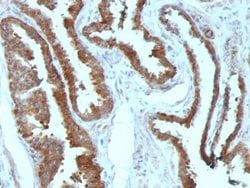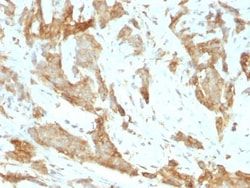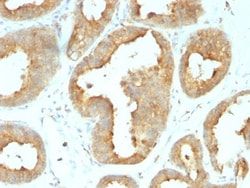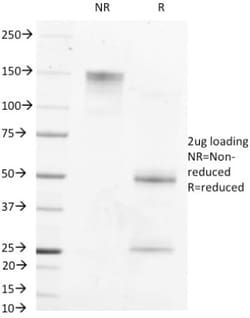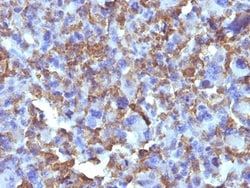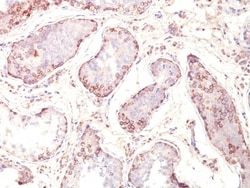HSP60 Antibody (HSPD1/875), Novus Biologicals™
Mouse Monoclonal Antibody
Manufacturer: Fischer Scientific
The price for this product is unavailable. Please request a quote
Antigen
HSP60
Concentration
0.2 mg/mL
Applications
Flow Cytometry, Immunofluorescence
Conjugate
Unconjugated
Host Species
Mouse
Research Discipline
Apoptosis, Cellular Markers, Membrane Trafficking and Chaperones, Mitochondrial Markers
Formulation
10mM PBS and 0.05% BSA with 0.05% Sodium Azide
Gene Alias
60 kDa chaperonin, Chaperonin 60, CPN60, GROEL, heat shock 60kD protein 1 (chaperonin), heat shock 60kDa protein 1 (chaperonin), Heat shock protein 60, heat shock protein 65, HLD4, Hsp60, HSP-60, HSP60SPG13, HSP65, HuCHA60, Mitochondrial matrix protein P1,60 kDa heat shock protein, mitochondrial, P60 lymphocyte protein, short heat shock protein 60 Hsp60s1, spastic paraplegia 13 (autosomal dominant)
Gene Symbols
HSPD1
Isotype
IgG1 κ
Purification Method
Protein A or G purified
Test Specificity
Recognizes a 60kDa protein, identified as the heat shock protein 60 (hsp60). A wide variety of environmental and pathophysiological stressful conditions trigger the synthesis of a family of proteins known as heat shock proteins (hsps), more appropriately called as stress response proteins (srps). hsp60 is a potential antigen in a number of autoimmune diseases. In human arthritis and in experimentally induced arthritis in animals, disease development coincides with the development of immune reactivity directed against not only bacterial hsp60, but also against its mammalian homolog.
Clone
HSPD1/875
Dilution
Flow Cytometry 0.5 - 1 ug/million cells in 0.1 ml, Immunofluorescence 0.5 - 1.0 ug/ml
Classification
Monoclonal
Form
Purified
Regulatory Status
RUO
Target Species
Human, Mouse, Rat, Chicken, Guinea Pig, Hamster, Monkey
Gene Accession No.
P10809
Gene ID (Entrez)
3329
Immunogen
Recombinant human HSPD1 protein
Primary or Secondary
Primary
Content And Storage
Store at 4C.
Molecular Weight of Antigen
60 kDa
Description
- Ensure accurate, reproducible results in Flow Cytometry, Immunofluorescence HSP60 Monoclonal specifically detects HSP60 in Human, Mouse, Rat, Chicken, Guinea Pig, Hamster, Monkey samples
- It is validated for Western Blot, Immunocytochemistry/Immunofluorescence, Immunohistochemistry-Paraffin, Protein Array.

